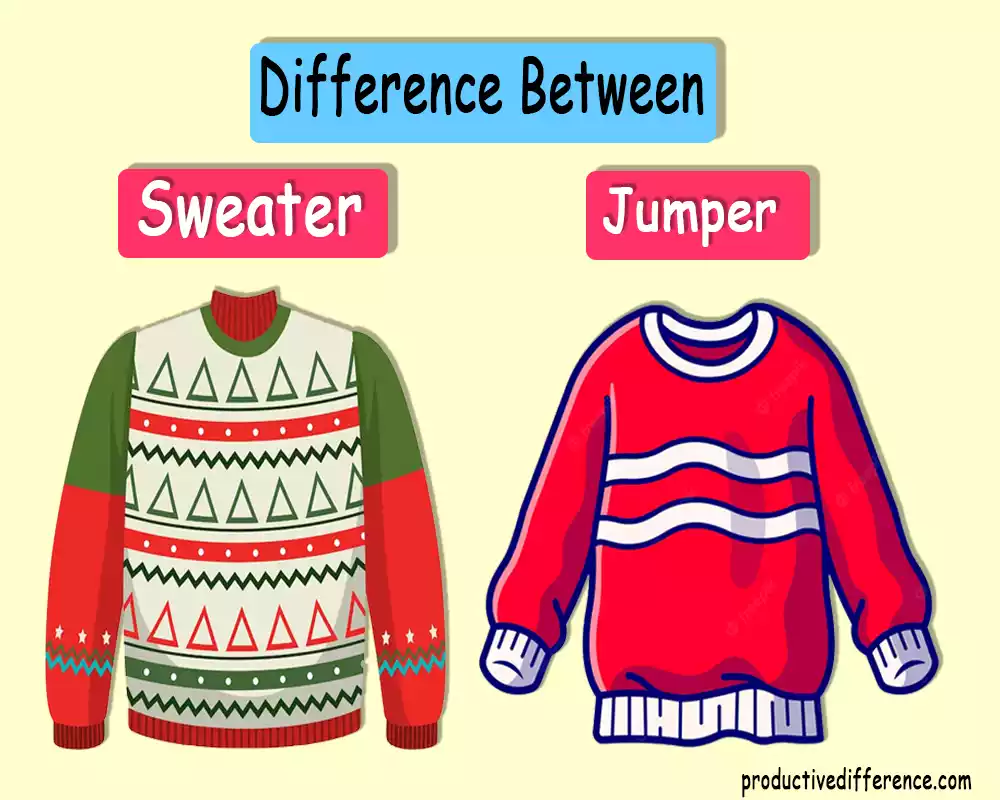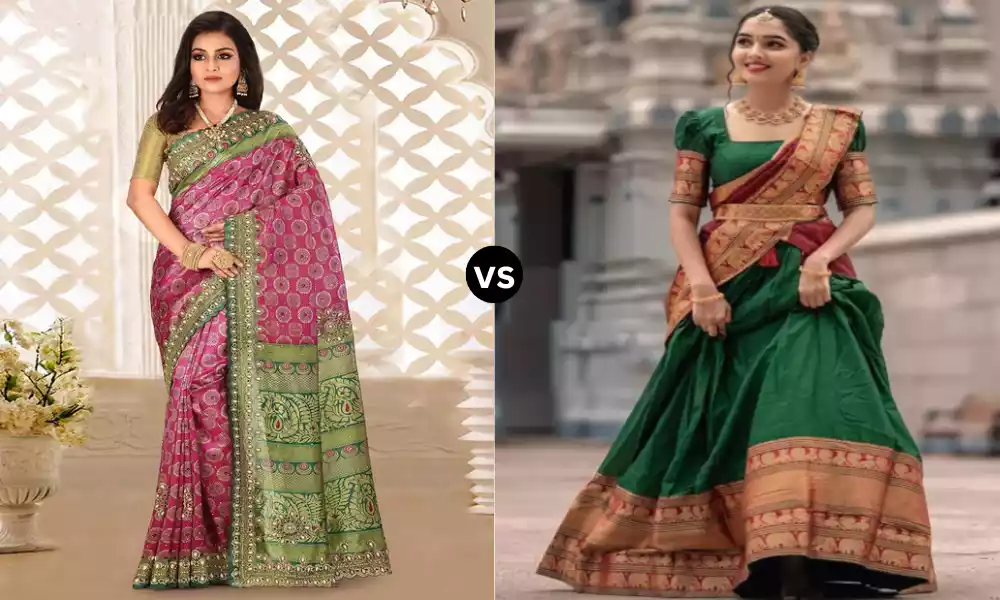Introduction to Traditional Society and Modern Society
In today’s rapidly changing world, the distinction between traditional society and modern society has become increasingly evident. Traditional societies are rooted in long-established customs, beliefs, and practices, emphasizing collective values and strong community ties. On the other hand, modern societies are characterized by technological advancements, globalization, and a shift toward individualism.
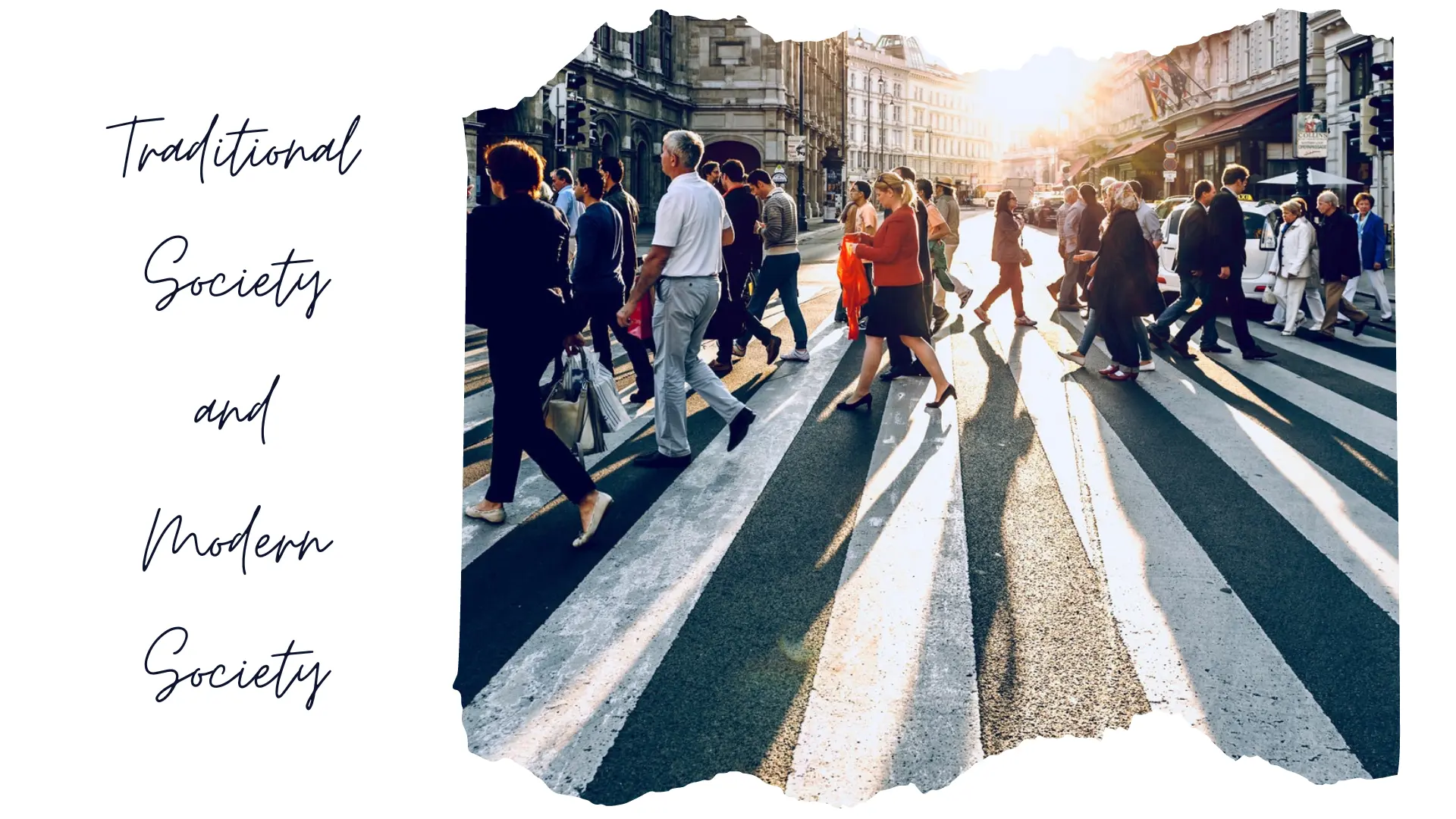
This article explores the dynamics between traditional society and modern society, examining their defining characteristics, the factors driving the transition, and the impact on culture and values. Let’s delve into the fascinating contrast between these two societal frameworks.
Societies evolve, and two prominent types of societies are traditional society and modern society. Traditional society refers to a social structure and way of life rooted in customs, rituals, and long-established beliefs, while modern society represents a more progressive and dynamic social order shaped by industrialization, technological advancements, and globalization. This article aims to explore and highlight the key differences between traditional society and modern society, shedding light on various aspects such as social structure, economy, technology, religion, gender roles, and education.
Definition of Traditional Society
Traditional society refers to an established social structure with deeply-ingrained customs, beliefs, and practices passed down over generations. It is characterized by its adherence to established norms, hierarchical systems, and close-knit communities. Such societies often prioritize stability, the preservation of cultural heritage, and the continuation of ancestral traditions. The Definition of Traditional Society encompasses a rich tapestry of values, rituals, and collective identities that have played a pivotal role in shaping human civilizations.
The Dawn of Traditional Society: Ancient Civilizations
Traditional societies can be traced back to the birth of civilization. Ancient civilizations laid down the foundations for the social and cultural systems that would later shape traditional societies. This article explores the emergence of traditional society through the lens of ancient civilizations, examining their characteristics, social structures, and cultural practices. Join us on a journey through time as we explore the fascinating beginnings of traditional society.
Mesopotamia: Cradle of Civilization
Mesopotamia was an ancient land where traditional society first emerged on the fertile banks of the Tigris and Euphrates rivers, featuring city-states with intricate legal systems and agricultural practices that laid the groundwork for later civilizations. Their rich cultural legacy can be seen through such landmarks as Hammurabi’s Code one of the earliest legal codes ever developed and magnificent ziggurat construction as evidence of Mesopotamian society’s profound legacy.
Egypt: Guardians of the Nile
The mighty Nile River nurtured the emergence of traditional society in ancient Egypt. With pharaohs as divine rulers, a complex religious belief system, and grand architectural marvels such as the pyramids and temples, Egyptian society reflected a deep reverence for the afterlife and a harmonious relationship with the natural world. The preservation of mummies and hieroglyphic writing further illustrates their commitment to perpetuating their cultural legacy.
Traditional Society: Indigenous Cultures and Tribal Traditions
Traditional society encompasses a diverse range of indigenous cultures and tribal traditions that have flourished throughout history. These societies, often rooted in deep connections with the land, carry unique perspectives, customs, and ways of life. Let’s delve into the rich tapestry of traditional societies, highlighting their importance and contributions to our collective human heritage.
Native Americans: Wisdom of the Land
Indigenous cultures flourished across the vast expanse of the Americas, embracing a profound connection with the land. Native American societies, such as the Cherokee, Navajo, and Inca, revered nature, practiced sustainable agricultural techniques, and passed down ancient wisdom through oral tradition. Their intricate artwork, spiritual ceremonies, and deep-rooted respect for the natural world continue to inspire and captivate modern generations.
African Tribes: Guardians of Ancestral Heritage
The diverse tribes of Africa epitomize the richness and resilience of traditional society. From the Maasai of East Africa to the Zulu of South Africa, these tribes have preserved their cultural heritage through vibrant rituals, storytelling, and intricate craftsmanship. With a profound reverence for ancestors, communal living, and tribal customs, African traditional societies reflect a deep sense of identity and unity.
Asian Traditions: Tapestry of Diversity
Asia, with its vast array of cultures, encompasses a myriad of traditional societies. From the ancient civilization of China, with its intricate social hierarchy and philosophical teachings, to the indigenous tribes of Southeast Asia, such as the Hmong and Karen, Asian traditions are characterized by their unique customs, spiritual practices, and artistic expressions. The harmonious integration of humans with the natural world and the preservation of ancient wisdom continue to define Asian traditional societies.
Key Characteristics of Traditional Society
Traditional society is characterized by strong community bonds, where individuals prioritize collective well-being over personal aspirations. The preservation of cultural heritage is of utmost importance, with customs, rituals, and oral traditions being passed down through generations. Prescribed gender roles define societal expectations, and a subsistence-based economy, primarily reliant on agriculture and manual labor, ensures self-sufficiency.
Family Structure in Traditional Society
Family structure in traditional society often revolves around the extended family. Multiple generations live together under one roof, sharing resources and responsibilities. The extended family plays a vital role in the upbringing of children and provides a support system for its members.
Role of Religion in Traditional Society
Religion holds significant influence in traditional societies, acting as a moral compass and shaping social norms. Religious practices are deeply embedded in daily life, guiding behavior, and dictating societal rules and expectations. Traditional societies often have a predominant religious belief system that influences all aspects of life, from governance to personal conduct.
Exploring Modern Society
Modern society, in stark contrast to its traditional counterpart, embraces change, innovation, and progress. It values individualism, personal autonomy, and the pursuit of personal goals. Let’s explore the key characteristics of modern society:
Key Characteristics of Modern Society
Modern society places great emphasis on individual rights, freedom, and personal choices. It is characterized by rapid technological advancements that have revolutionized communication, transportation, and industries. Global interconnectedness has become a defining feature of modern society, enabling the exchange of ideas, cultures, and resources on a global scale. Furthermore, modern society relies on a knowledge-based economy, where intellectual capital and specialized skills drive economic growth.
Family Structure in Modern Society
In modern society, the nuclear family is often the primary unit. Individuals prioritize independence and privacy, and family dynamics have evolved to reflect this shift. Smaller family sizes and a focus on immediate family members are common in modern societies.
Role of Religion in Modern Society
The role of religion in modern society varies across different regions and cultures. However, while some modern societies hold on to strong religious practices and beliefs, others have become more secular or have adopted diverse spiritual and religious perspectives. Modern society allows for greater freedom of belief and encourages individual exploration of spirituality.
Modern Society traditions
In modern society, traditions continue to hold significance despite the rapid pace of change and the embrace of innovation. While modernity often emphasizes progress and forward-thinking, several traditions persist and shape the cultural fabric of modern societies.
Let’s explore some of the traditions found in modern society:
- Holiday Celebrations: Modern society preserves and celebrates various holidays and festivities that have deep historical and cultural roots. These traditions, whether they are Christmas, Diwali, or Hanukkah celebrations, or cultural and religious ones, bring people together. They foster a community and allow for joyful gatherings and reflection.
- Wedding Customs: Weddings in modern society still adhere to traditional customs, albeit with some adaptations to reflect personal preferences and evolving social norms. Ceremonies, rituals, and customs associated with weddings, such as exchanging vows, wearing specific attire, and honoring cultural practices, continue to be cherished and celebrated.
- Cultural Festivals: Modern society embraces cultural festivals that showcase the diversity and richness of different communities. Festivals such as Carnival, Oktoberfest, Chinese New Year, and Thanksgiving allow people to share in cultural traditions while simultaneously celebrating cultural heritage and creating intercultural understanding.
- Family Traditions: Families in modern society often have their unique traditions that are passed down through generations. These may include annual family reunions, special meals, storytelling, or specific activities that create a sense of continuity, connection, and shared experiences within the family unit.
- Sporting Events: Sporting traditions are deeply rooted in modern society, with events like the Olympic Games, Super Bowl, World Cup, and Wimbledon capturing global attention. These events not only showcase athletic excellence but also carry a sense of tradition and national pride as fans gather to support their teams and celebrate the spirit of competition.
- Artistic and Cultural Traditions: Modern society continues to appreciate and preserve artistic and cultural traditions. Traditional forms of music, dance, theater, and visual arts are cherished, while contemporary expressions of creativity and innovation also find their place. Museums, galleries, and cultural institutions play a vital role in preserving and promoting these traditions.
- Religious Observances: Despite the secular nature of modern society, religious observances and traditions still hold importance for many individuals and communities. Practices such as attending religious services, observing religious holidays, and engaging in rituals and ceremonies are valued as a way to connect with one’s spiritual beliefs and heritage.
While modern society embraces traditions, these traditions often evolve and adapt to reflect changing social dynamics, values, and cultural influences. Modernity and tradition can coexist, with traditions providing a sense of continuity, identity, and connection to the past, while also embracing the possibilities and progress of the present.
The key differences between Traditional society and Modern Society
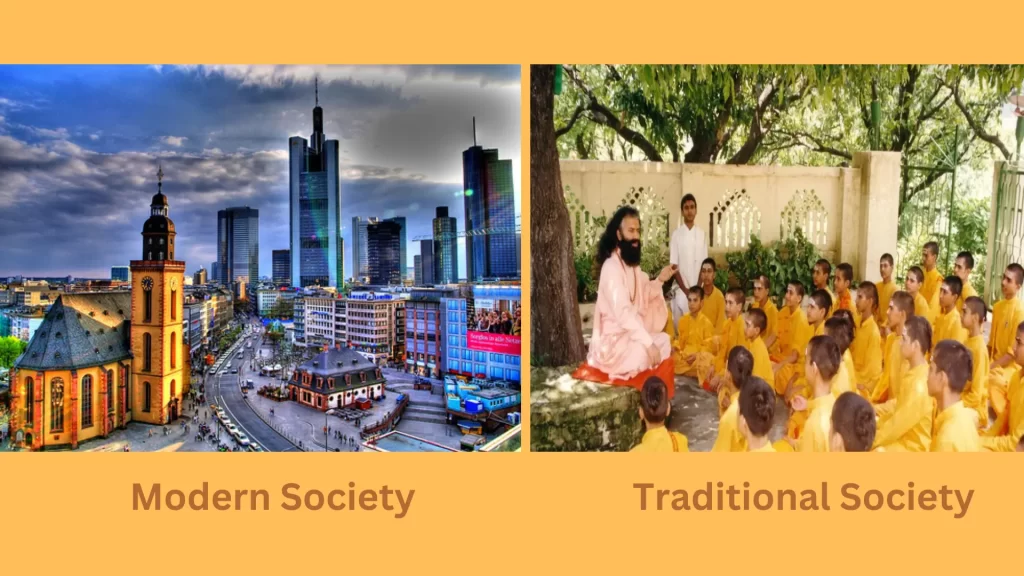
When comparing traditional society and modern society, several key contrasts emerge.
Let’s explore some of the most notable differences:
Individualism vs. Collectivism
Traditional society places a strong emphasis on collectivism, where the community’s well-being takes precedence over individual desires. In contrast, modern society prioritizes individualism, empowering individuals to pursue their personal goals and aspirations.
Technological Advancements
One of the defining features of modern society is its rapid technological progress. Technological advancements have transformed various aspects of life, from communication to healthcare, making modern societies more interconnected and globally aware.
Changing Gender Roles
Traditional societies often have prescribed gender roles, where men and women have distinct expectations and responsibilities. In modern society, there is a gradual shift towards challenging traditional gender norms, promoting equality, and empowering individuals to defy stereotypes.
- Social Structure and Individualism: Traditional societies often have a collectivist social structure, where the community takes precedence over the individual. In contrast, modern societies emphasize individualism, placing greater importance on personal autonomy, freedom of choice, and the pursuit of individual goals and aspirations.
- Economic System: Traditional societies typically have subsistence-based economies, focusing on agriculture, hunting, or gathering. Modern societies are characterized as knowledge-based economies, which rely heavily on industrialization and technology.
- Family Structure: Traditional societies often have extended family structures, where multiple generations live together and contribute to the family’s well-being. In modern societies, the nuclear family structure is more prevalent, consisting of parents and their children, with a greater emphasis on independence and privacy.
- Gender Roles: Traditional societies tend to have clearly defined gender roles, with distinct expectations for men and women. These roles are often based on societal norms and cultural traditions. In modern societies, there is a greater emphasis on challenging traditional gender norms, promoting gender equality, and recognizing diverse gender identities.
- Technology and Communication: Traditional societies typically have limited access to technology, relying on traditional modes of communication, such as oral traditions and face-to-face interactions. Modern societies, in contrast, are characterized by advanced technology and widespread access to communication tools, allowing for instant global connectivity.
- Education Systems: Education in traditional societies often emphasizes informal and experiential learning, with knowledge passed down through generations. Modern societies prioritize formal education systems, institutions, and specialized knowledge acquisition through schools, colleges, and universities.
- Change and Adaptability: Traditional societies tend to be resistant to change and value the preservation of cultural heritage and customs. Modern societies embrace innovation and change, realizing the need to adapt and evolve to social, technological, and environmental challenges.
- Religious and Spiritual Beliefs: Religion holds significant influence in traditional societies, shaping social norms, moral values, and community cohesion. In modern societies, religious beliefs and practices may vary, with a greater emphasis on secularism, diverse belief systems, and personal spirituality.
The key differences between traditional society and modern society reflect changes in social structures, economic systems, and cultural practices over time. It is important to acknowledge and understand these distinctions to navigate the complexities of societal transformations and foster intercultural dialogue and appreciation.
Traditional Society and Modern Society comparison table
| Traditional Society | Modern Society |
|---|---|
| Strong community bonds | Emphasis on individualism |
| Collective well-being prioritized | Personal aspirations and goals emphasized |
| Preservation of cultural heritage | Embrace change and innovation |
| Subsistence-based economy | Knowledge-based economy |
| Extended family structure | Nuclear family structure |
| Prescribed gender roles | Challenging traditional gender norms |
| Religion holds a significant influence | Varies in religious beliefs and practices |
| Informal and experiential learning | Formal education systems |
| Agrarian and rural lifestyle | Urbanization and globalization |
| Limited technological advancements | Rapid technological progress |
| Reliance on customs, rituals, and oral traditions | Global interconnectedness |
| Adherence to established norms | Greater freedom of belief and personal choices |
| Community-centric governance | Individual rights and freedoms |
| Focus on collective identity | Embrace diversity and multiculturalism |
| Self-sufficiency | Interdependence and global exchange |
| Slow societal change | Constant societal evolution |
The societal transformations from traditional to modern society
The transformation from traditional to contemporary society has lasting ramifications on individuals, communities, and all of society as a whole.
Let’s explore some of the key implications of traditional society and modern society transformations:
- Individual Autonomy and Freedom: The shift from traditional to modern society has led to increased individual autonomy and freedom. Modern societies place greater emphasis on personal choice, empowering individuals to make decisions regarding their lifestyles, careers, and relationships based on their preferences and aspirations.
- Changing Social Structures: Traditional societies are often characterized by strong community bonds and collective identities. As societies become more modern, there is a shift towards nuclear family structures and a greater emphasis on individualism. This can lead to changes in social dynamics, support systems, and interpersonal relationships.
- Economic Opportunities and Inequality: Modern society brings with it new economic opportunities, technological advancements, and specialized knowledge. However, it also exacerbates economic inequality, as specific individuals or groups may benefit more from these opportunities, leading to a widening wealth gap within society.
- Cultural Adaptation and Preservation: As societies modernize, there is a delicate balance between cultural adaptation and preservation. Modern societies strive to embrace diversity, multiculturalism, and global interconnectedness. However, there is also a risk of cultural erosion as traditional practices, languages, and customs may face challenges in a rapidly changing world.
- Technological Advancements and Digital Divide: The advent of modern society has been closely intertwined with rapid technological advancements. While advancements provide many advantages, they also create an immense digital divide between those with access to technology and those without. This divide can exacerbate existing social and economic disparities.
- Education and Knowledge Acquisition: Modern society places a high value on formal education and specialized knowledge. This has implications for individuals seeking employment and social mobility, as access to quality education becomes increasingly important. However, this raises serious concerns regarding accessibility and affordability for all members of society.
- Environmental Impact and Sustainability: The shift to modern society has led to increased urbanization, industrialization, and resource consumption. This has severe ramifications for the environment, such as climate change, biodiversity loss, and natural resource depletion. Modern societies are grappling with the need to balance economic growth with environmental sustainability.
- Changing Values and Moral Frameworks: Societal transformations impact the values and moral frameworks that guide individuals and communities. Traditional societies often have deeply rooted moral codes and ethical norms based on religious or cultural beliefs. Modern societies, with their emphasis on individualism and personal freedom, may experience shifts in values and ethical considerations.
These implications highlight the complex nature of societal transformations from traditional to modern society. While there are numerous benefits and opportunities, there are also challenges and potential drawbacks. Societies must navigate these changes in a way that promotes inclusivity, sustainability, and social well-being while preserving important aspects of cultural heritage and community cohesion.
It is also important to consider the ethical dimensions of societal transformations. As values and moral frameworks evolve, societies must navigate the ethical implications of technological advancements, economic systems, and environmental sustainability.
Cultural differences between Traditional Society and Modern Society
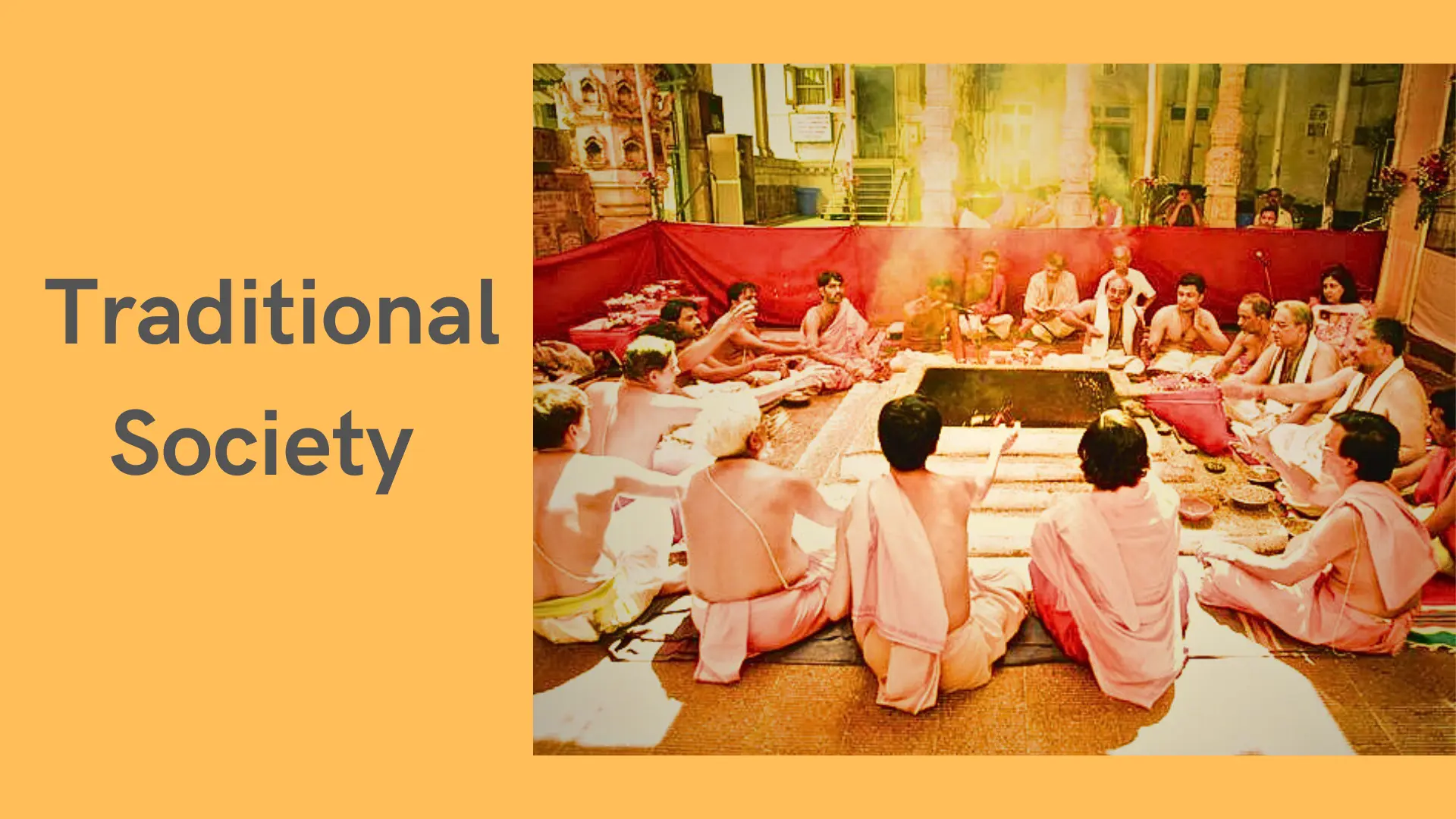
In comparing traditional society and modern society, it is evident that cultural differences play a significant role in shaping these distinct social systems.
Let’s explore the cultural differences between traditional society and modern society:
Cultural Values and Beliefs
Traditional Society: Traditional societies often place a strong emphasis on preserving cultural heritage, customs, and traditions. They value collective identity, community cohesion, and adherence to established norms and practices. Cultural values are deeply rooted in the traditions and wisdom passed down through generations.
Modern Society: In modern society, cultural values often prioritize individualism, personal autonomy, and the pursuit of personal goals and aspirations. There is a greater acceptance of diversity and multiculturalism, as modern societies embrace different cultural perspectives and encourage freedom of expression and belief.
Social Structure and Roles
Traditional Society: Traditional societies tend to have a hierarchical social structure with clearly defined roles and responsibilities. Gender roles are often prescribed, with distinct expectations for men and women. The extended family plays a central role in the social fabric, with multiple generations living together and in collective decision-making.
Modern Society: Modern societies typically have a more egalitarian social structure, where equality and equal opportunities are emphasized. There is an increasing recognition of gender equality and the breaking down of traditional gender roles. The nuclear family structure is more prevalent, and individual choices and personal autonomy are valued.
Communication and Technology
Traditional Society: In conventional societies, communication often relies on oral traditions, storytelling, and face-to-face interactions within the community. Technology, if present, is limited, and information dissemination is primarily through interpersonal relationships and local networks.
Modern Society: Communication in modern society is characterized by advanced technology and widespread access to information. Digital platforms, social networks, and global networks are all forms of communication that modern societies use. Technology has transformed the way people connect, exchange ideas, and access information across the globe.
Education and Knowledge Transmission
Traditional Society: Education in traditional societies is often based on informal and experiential learning. Knowledge is transmitted through apprenticeships, oral traditions, and practical skills passed down from elders to younger generations. Education is deeply intertwined with community values and cultural practices.
Modern Society: Modern societies prioritize formal education systems, with structured curricula and institutions. Education is seen as a means to acquire specialized knowledge and skills necessary for participation in the global economy. There is a strong emphasis on literacy, numeracy, and intellectual development.
Perception of Time and Change
Traditional Society: Traditional societies tend to have a cyclical perception of time, where rituals and recurring events mark the passage of time. Change is often gradual and rooted in preserving cultural continuity. Traditional societies value stability and the wisdom of the past.
Modern Society: Modern societies have a linear perception of time, emphasizing progress, innovation, and future-oriented goals. Change is embraced and often rapid, driven by technological advancements and evolving societal needs. Modern societies value adaptability and embrace new ideas and possibilities.
These cultural differences between traditional society and modern society shape the way individuals and communities perceive the world, interact with one another, and navigate societal transformations. It is important to recognize and respect these cultural differences while fostering understanding and dialogue between different societies and generations.
As societies become more interconnected through technology and globalization, there is a need for cross-cultural understanding and dialogue. Respect for diverse perspectives, values, and traditions is essential in fostering a harmonious and inclusive modern society.
The differences between traditional society and modern society are profound and shape the way communities function, values are upheld, and individuals interact with the world. Traditional society emphasizes community, collectivism, and adherence to established norms, while modern society values individualism, innovation, and progress.
As societies continue to evolve, understanding the dynamics of traditional society and modern society becomes crucial for navigating the complexities of societal transformations. It is essential to strike a balance between preserving cultural heritage and embracing the opportunities brought by technological advancements and globalization.
We can achieve a harmonious coexistence by appreciating both traditional society and modern society. This will allow us to respect the values of the old while welcoming the possibilities of tomorrow.
Final Opinion of Traditional Society and Modern Society
The comparison between traditional society and modern society highlights significant differences in social structures, values, economic systems, and cultural practices. Traditional societies are characterized by collectivism, subsistence-based economies, extended family structures, and adherence to well-defined gender roles. In contrast, modern societies prioritize individualism, knowledge-based economies, nuclear family structures, and the challenge of traditional gender norms.

